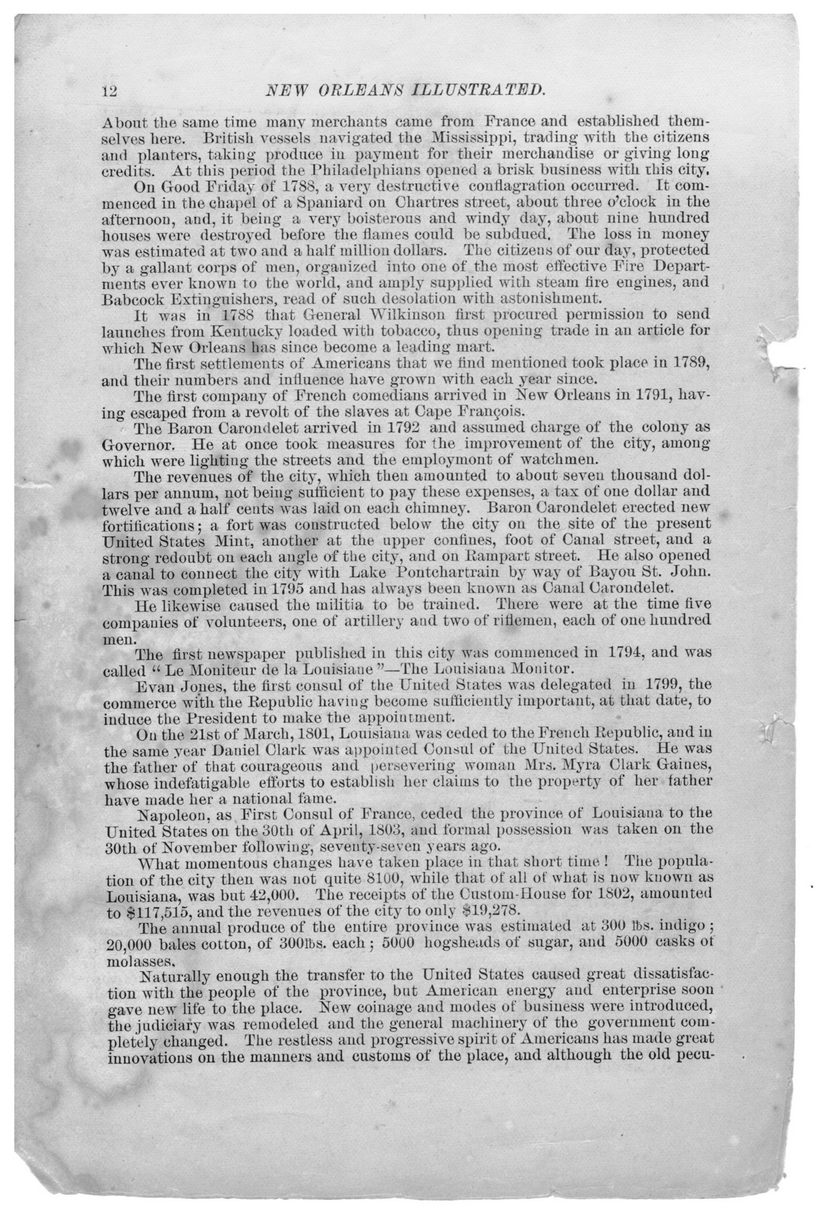This text was obtained via automated optical character recognition.
It has not been edited and may therefore contain several errors.
12 NEW ORLEANS ILLUSTRATED. About the same time many merchants came from France and established themselves here. British vessels navigated the Mississippi, trading with the citizens ami planters, taking produce in payment for their merchandise or giving long credits. At this period the Philadelphians opened a brisk business with this city. On Good Friday of 1788, a very destructive conflagration occurred. It commenced in the chapel of a Spaniard on Chartres street, about three o’clock in the afternoon, and, it being a very boisterous and windy day, about nine hundred houses were destroyed before the flames could be subdued. The loss in money was estimated at two and a half million dollars. The citizens of our day, protected by a gallant corps of men, organized into one of the most effective Fire Departments ever known to the world, and amply supplied with steam tire engines, and Babcock Extinguishers, read of such desolation with astonishment. It was in 1788 that General Wilkinson first procured permission to send launches from Kentucky loaded with tobacco, thus opening trade in an article for which New Orleans has since become a leading mart. The first settlements of Americans that we find mentioned took place in 1789, and their numbers and iniluence have grown with each year since. The first company of French comedians arrived in New Orleans in 1791, having escaped from a revolt of the slaves at Cape Francois. The Baron Carondelet arrived in 1792 and assumed charge of the colony as Governor. He at once took measures for the improvement of the city, among which were lighting the streets and the employmont of watchmen. The revenues of the city, which then amounted to about seven thousand dollars per annum, not being sufficient to pay these expenses, a tax of one dollar and twelve and a half cents was laid on each chimney. Baron Carondelet erected new fortifications; a fort was constructed below the city on the site of the present United States Mint, another at the upper confines, foot of Canal street, and a strong redoubt on each angle of the city, and on Rampart street. He also opened a canal to connect the city with Lake Pontchartrain by way of Bayou St. John. This was completed in 1795 and has always been known as Canal Carondelet. He likewise caused the militia to be trained. There were at the time five companies of volunteers, one of artillery ami two of rillemen, each of one hundred men. The first newspaper published in this city was commenced in 1791, and was called “Le Moniteur de la Louisiatie”—The Louisiana Monitor. Evan Jones, the first consul of the United Slates was delegated iu 1799, the commerce with the Republic having become sufficiently important, at that date, to induce the President to make the appointment. On the 21st of March, 1801, Louisiana was ceiled to the French Republic, and in the same year Daniel Clark was appointed Consul of the United States. He was the father of that courageous and persevering woman Mrs. Myra Clark Gaines, whose indefatigable efforts to establish her claims to the property of her father have made her a national fame. Napoleon, as First Consul of France, ceded the province of Louisiana to the United States on the 30th of April, 1803, and formal possession was taken on the 30th of November following, seventy-seven years ago. What momentous changes have taken place in that short time ! Tins population of the city then was not quite 81U0, while that of all of what is now known as Louisiana, was but 12,000. The receipts of the Custom-House for lt>02, amounted to $117,515, and the revenues of the city to only $19,278. The annual produce of the entire province was estimated at 300 tt>s. indigo; 20,000 bales cotton, of 3001bs. each ; 5000 hogsheads of sugar, and 5000 casks ot molasses. Naturally enough the transfer to the United States caused great dissatisfaction with the people of the province, but American energy and enterprise soon gave new life to the place. New coinage and modes of business were introduced, the judiciary was remodeled and the general machinery of the government completely changed. The restless and progressive spirit of Americans has made great innovations on the manners aud customs of the place, aud although the old pecu-

New Orleans Illustrated New Orleans Illustrated (060)